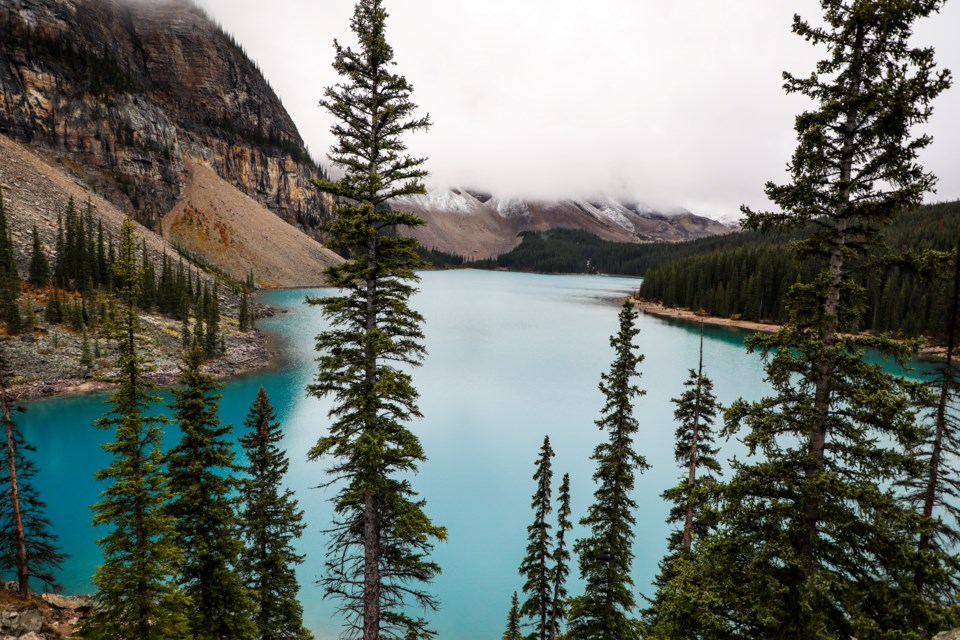Parks Canada plans to run an early sunrise shuttle bus to Moraine Lake this year to help deal with challenges faced by the climbing community since the road was closed to private vehicles last year.
The final details are still being ironed out, but Parks Canada officials say they can confirm 4 a.m. and 5 a.m. departures on a 50-seat shuttle bus to get mountaineers and climbers earlier to the famed climbing area, including Mount Temple and Valley of the Ten Peaks.
“We’re very hopeful this will help the climbing community and open up interesting opportunities,” said François Masse, park superintendent for Lake Louise, Yoho and Kootenay field unit during the 24th annual Banff National Park planning forum on Wednesday (Feb. 28).
The 12.8-kilometre scenic road to the iconic Moraine Lake was closed to personal vehicles year-round in 2023, with access only permitted via Parks Canada-run shuttles from a park-and-ride lot at the Lake Louise ski hill, Roam public transit, commercial buses, and taxis from June to mid-October.
The change was in response to bumper-to-bumper traffic and heavy congestion all summer long. The Moraine Lake lot accommodated about 900 vehicles on a busy summer day, but before the ban on private vehicles, roughly 5,000 vehicles a day were being turned away.
The annual fall pilgrimage of visitors to view the larch trees turning gold also added to the over-crowding pressures at Moraine Lake.
“We did reach a breaking point,” said Masse.
“The vast majority of visitors were getting turned away, so we had to make a big shift and it’s worked out fairly well.”
However, the new system created challenges for the mountaineering and climbing community, which needs early starts and late returns to access some of the region’s most popular routes, such as the classic East Ridge of Mount Temple – one of the top 50 classic climbs of North America.
“I recognize the need for the shuttle service, however, it has greatly affected the options for the mountaineering community in the area,” said Michael Geertsema, facilities manager for the Alpine Club of Canada.
Geertsema said the new 4 and 5 a.m. bus shuttles will go a long way in addressing some of the climbing community’s concerns for an early alpine start, particularly for those wanting to access Mount Temple.
“I think it will be the hikers, scramblers using it more than climbers, but I think a number of climbers are excited for it or will be excited for the opportunity because the previous program starting at 6 a.m.,- that’s just too late for most of the alpine routes,” he said.
Getting an early start for climbers is a safety issue, having to hike in during early morning hours, climb in daylight hours and be able to top out before it gets dark again.
In addition, an early start is necessary given the nature of the harsh alpine environment with snow, ice, glaciers and seracs and climbers wanting to avoid the heat of the day during melting.
“A lot of the routes in the Moraine Lake area are big routes, so the one that a lot of people sort of reference and talk about is the northeast face of Mount Temple and you’re looking at a 16-hour day, so the earlier people can start the earlier they can finish,” said Geertsema.
Geertsema said they are still waiting to hear from Parks Canada on what the program will look like for people not getting back until after the last shuttles or transit of the day.
“For a number of clients, even starting at 4 a.m., you’re at the trailhead at 4:30, 4:45, it’s still not necessarily enough time to get back for the last bus at 7 p.m. or 8 p.m.,” he said.
“That’s still a concern that we’re looking for details on and support on.”
The Alpine Club is also looking for solutions for the Neil Colgan Hut, which is accessed from Moraine Lake via a long approach involving technical climbing and glacier travel.
Once at the hut, there are numerous moderate alpine routes close by, including many of the summits of the Valley of the Ten Peaks.
“I look forward to trying to find some other solutions because I do know that the current solution is not a solution for guests of the Neil Colgan Hut,” said Geertsema.
“That’s going to be a challenge for us to sort of understand how we can continue to have guests mountaineering on Mount Fay and the higher alpine of the Valley of the Ten Peaks.”
Along with the challenges for the climbing community, there were also tardy hikers who regularly missed the last shuttles of the day last year.
Parks Canada is working on finding an operator interested in providing an emergency after-hours service, which will come at a cost to the people who miss the last bus.
An emergency telephone will also be installed at Moraine Lake for those who get stuck without a ride back.
“We are investigating the possibility of after-hours pick-up services at a cost to visitors,” said Masse.
While details are still being hammered out, the parking for catching the early-bird sunrise shuttle will likely be at Upper Lake Louise, where there is paid parking, because the Whitehorn Road to the park-and-ride at the Lake Louise ski hill is closed at the early time of day.
Masse said that’s because of protection of the Whitehorn wildlife corridor, which forms part of core habitat in the Lake Louise region for grizzly bears, a threatened species in Alberta.
“We’ve committed to not create traffic on that stretch of road during key times for movement of wildlife,” he said.




.jpg;w=120;h=80;mode=crop)